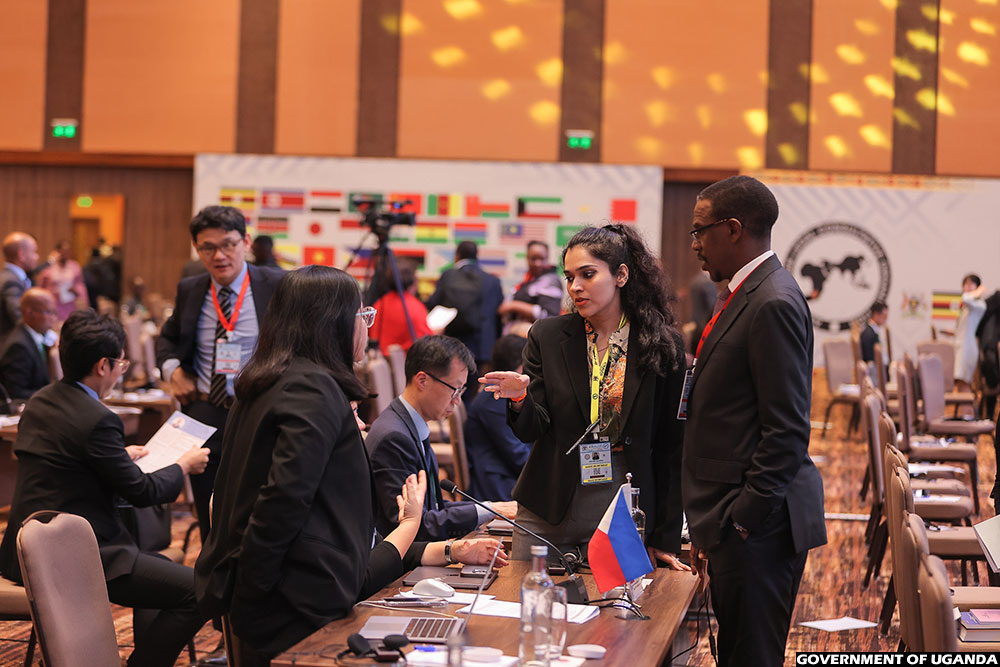News
Uganda urges AALCO on role in developing global plastic pollution treaty
"We must deliberately advance a climate justice perspective in our work," Minister Rebecca Kadaga, on behalf of Uganda, tells AALCO member states.
Uganda's First Deputy Prime Minister and Minister for East African Community Affairs, Rebecca Kadaga, presenting Uganda's statement to AALCO on environment and sustainable development on day three of the 63rd Annual Session of AALCO at Speke Resort Munyonyo in Kampala, on September 10, 2025. (Credit: Government of Uganda)
By: Joseph Kizza, Journalists @New Vision
______________________
📍 Speke Resort Munyonyo, Kampala
🗓️ September 8-12
___________________________
ENVIRONMENT
In mid-August this year, advanced talks to develop a global plastic pollution treaty adjourned without consensus in the Swiss city of Geneva. Being such a crucial instrument on a throbbing global headache that is plastic pollution, the Intergovernmental Negotiating Committee (INC) — tasked with developing this treaty — agreed to resume negotiations at a yet-to-be-announced future date.
Originally, the plan was to have the negotiations concluded by the end of 2024. But after five sessions held in different countries, including the third in Uganda's neighbour Kenya, there is still work to do to cross the finish line.
Nearly one month since the 10-day part two of INC's fifth session wrapped up without unanimity, Uganda is now rallying the Asian-African Legal Consultative Organisation (AALCO) to engage with the committee in "constructive dialogue" with a view to finalizing the text of this key international legally binding instrument on plastic pollution.
"The committee's deliberations carry immense significance in environmental protection and therefore require careful, focused and urgent attention with a strong commitment to solidarity and consensus," said Uganda on the third day of the ongoing 63rd Annual Session of AALCO in Kampala.
This was contained in Uganda's statement to AALCO on environment and sustainable development — presented by the First Deputy Prime Minister and Minister for East African Community Affairs, Rebecca Kadaga (pictured below, right) on Wednesday (September 10).
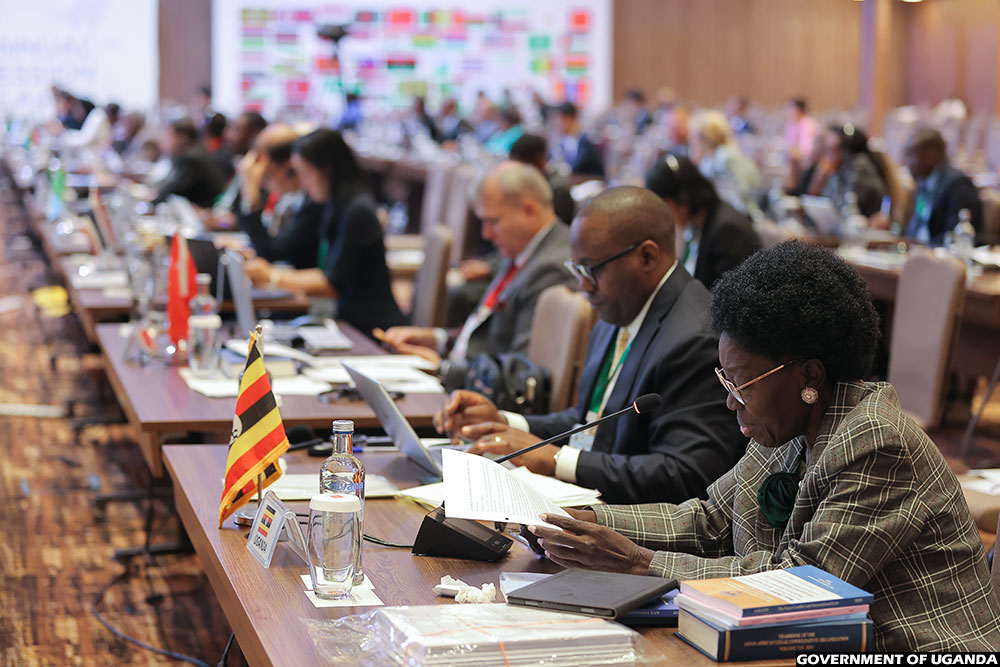
Plastic pollution, including in the marine environment, is a serious environmental and human health problem.
According to the World Health Organization (WHO), health risks exist at all stages of the plastic lifecycle — from production and use to recycling and disposal. And the impact on the ecosystem is worryingly telling.
The UN says that every year, 19-23 million tonnes (1 tonne is equivalent to 1,000kg) of plastic waste leaks into aquatic ecosystems, polluting lakes, rivers and seas.
The potential result is that ecosystems’ ability to adapt to climate change is reduced, which in turn affects millions of people’s livelihoods, food production capabilities and social well-being.
"The transboundary pollution, including plastic waste and hazardous chemicals, poses significant threats to human health and ecosystems," Kadaga told AALCO delegates in Uganda's capital.
"The regulation of hazardous substances requires urgent attention in Africa and Asia."
Transboundary pollution occurs when pollutants released in one country spread across national borders and cause harm in another country through environmental pathways like air, water, or soil.
▪️ Vietnam invites AALCO members to sign UN Convention against Cybercrime
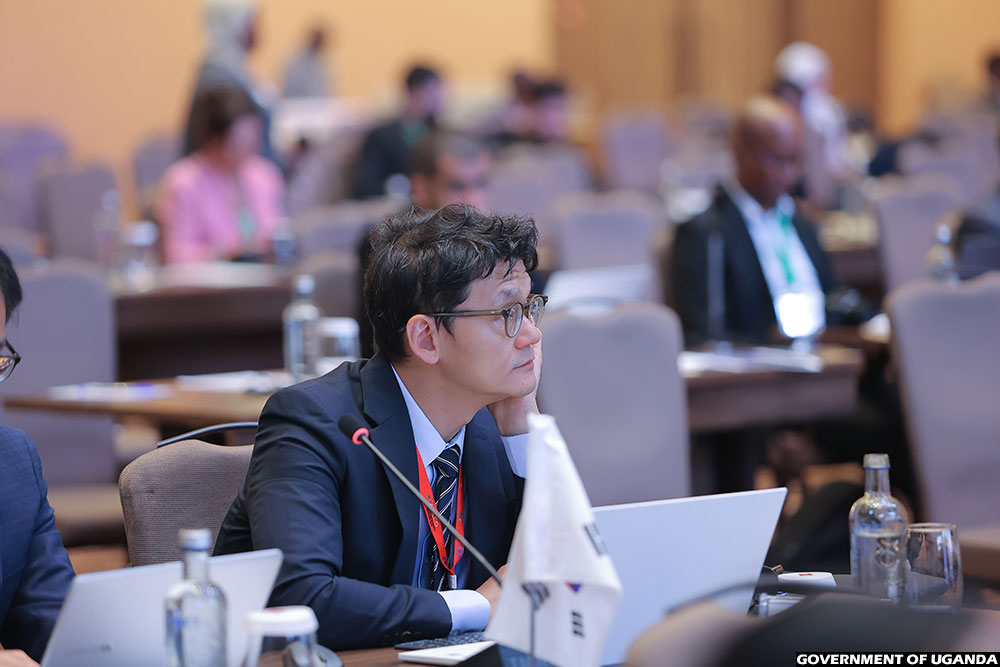
Kadaga also said waste management infrastructure in African and Asian countries, in compliance with international environmental standards, is a public health concern that requires urgent attention.
In Geneva last month, the INC's resumed fifth session drew more than 2,600 participants, including 1,400 member delegates from 183 countries.
That particular session's goal was to agree on the instrument's text and highlight unresolved issues needing further preparatory work.
Despite not landing the desired treaty at that time, UN Environment Programme (UNEP) executive director, Inger Andersen, remained positive that the dream will eventually be achieved.
"One thing remains clear: all countries clearly want to remain at the table," she said at the conclusion of that mid-August session.
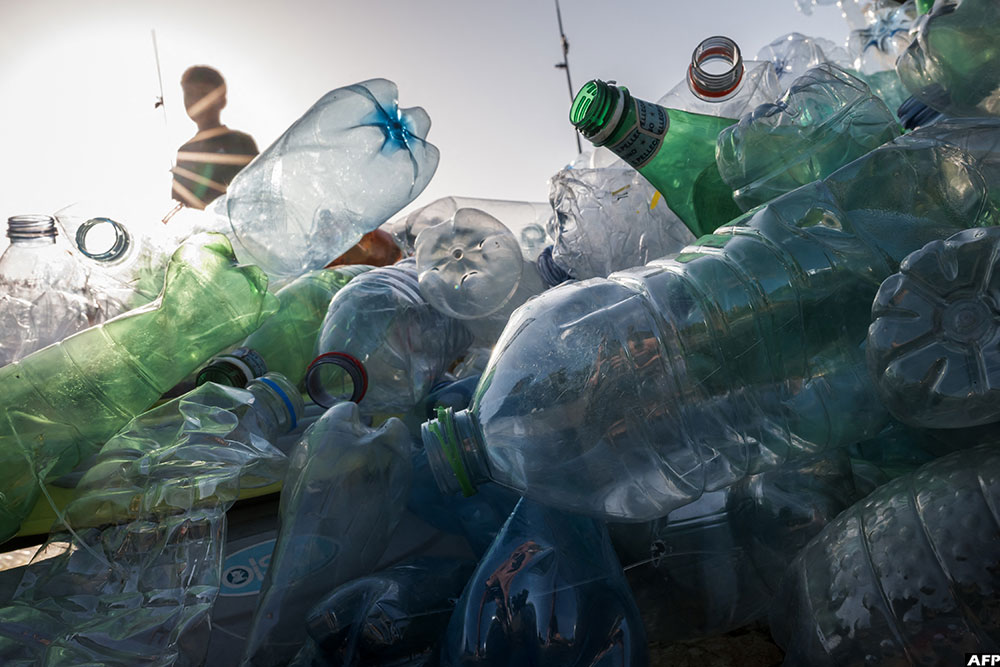
'Climate justice is not optional'
Fast-forward back to Kampala, Kadaga said Africa and Asia, the two regions represented in AALCO, are disproportinately affected by climate change.
"Our peoples face increasing droughts, floods, food insecurity, sea-level rise and displacement, all of which directly threaten development gains and the enjoyment of fundamental human rights," she said.
The Ugandan minister was also keen to underline that climate change is not merely an environmental issue but also a "profound question of justice, equity, and fairness", adding that the intersection of climate risks with governance arrangements is of immediate concern.
"Climate justice requires us to address historical and structural inequalities that have left many developing nations with limited adaptive capacity. Without corrective action, the adverse effects of climate change will deepen poverty, entrench inequality, and undermine sustainable development," said Kadaga.
"Climate justice is not optional. It is essential to an effective and sustainable global response."
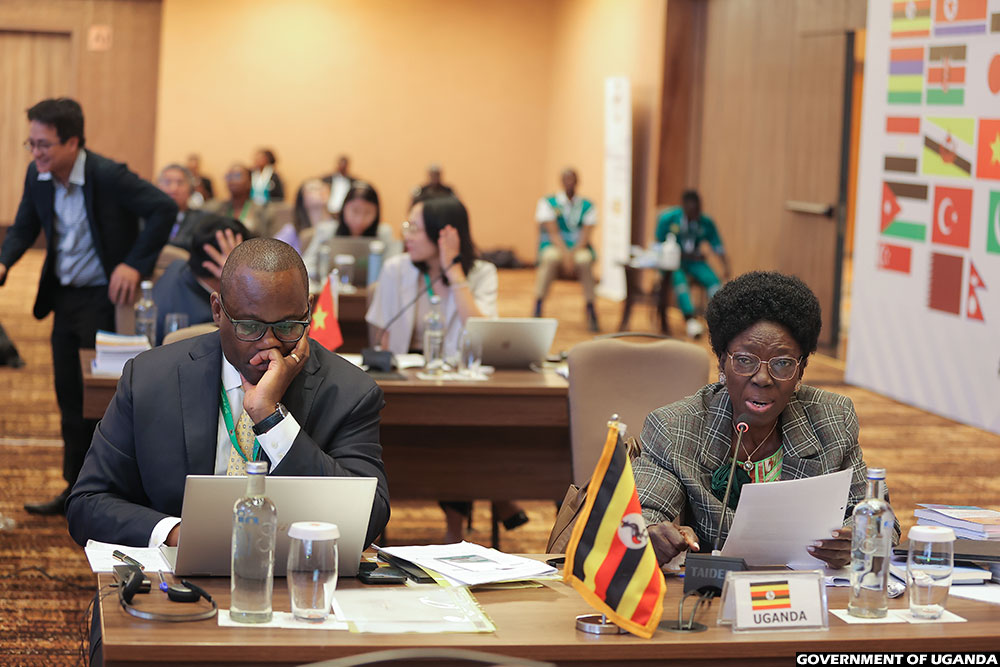
According to Uganda, the 49-member AALCO has a unique role to play.
"We must deliberately advance a climate justice perspective in our work. Risk assessments and climate responses that fail to account for equity considerations risk reinforcing existing vulnerabilities," said Kadaga.
"We, therefore, urge AALCO experts on environment to support member states in integrating climate justice into risk governance."
Uganda also urged action for promotion of sustainable resource governance, including equitable benefit-sharing and the protection of indigenous and local communities' rights.
It said the exploitation of natural resources such as minerals, forests, and water, often leads to environmental degradation and social inequalities.
"Uganda is committed to the preservation of the natural heritage and stands ready to collaborate with AALCO member states to advance environmental justice for sustainable development for the benefit of current and future generations," said Kadaga.
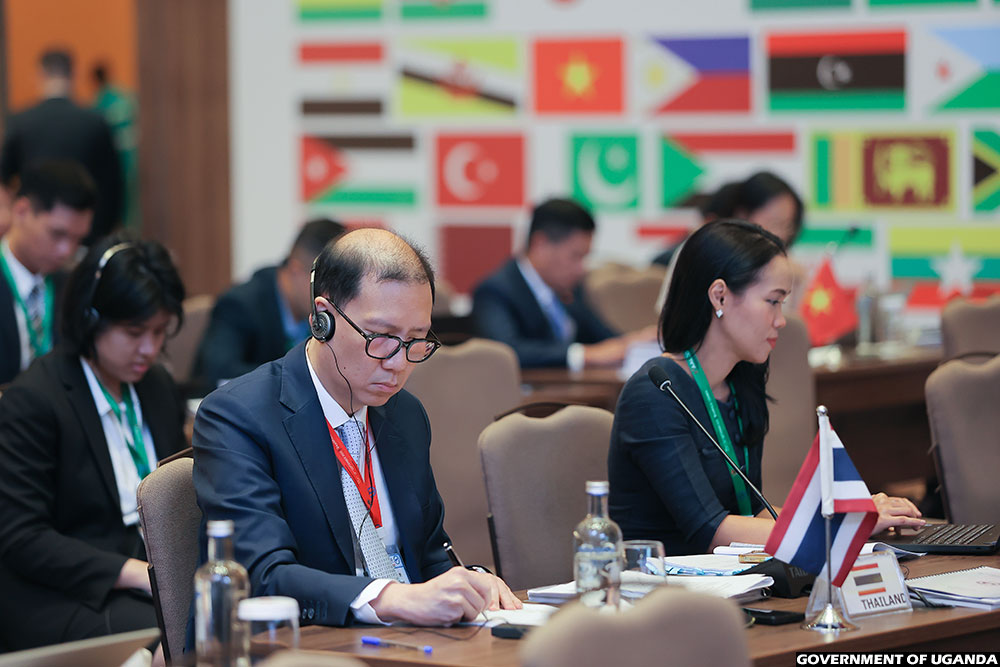
Uganda, which assumed the presidency of AALCO from the Kingdom of Thailand on the opening day of this 63rd Annual Session, is hosting AALCO for a second time, having first done so in 1993.
Established nearly seven decades ago following the historic Bandung Conference of 1955, AALCO is an intergovernmental organization that serves as an advisory body to its member states on matters of international law.
It seeks to articulate the shared legal perspectives of Asia and Africa on the global stage.
The organisation promotes international legal co-operation and provides a platform for member states to discuss and influence developments in international law, such as the law of the sea, climate change, cyber security, international trade law, peace and security, and dispute resolution mechanisms.
The 63rd AALCO session got under way on Monday at Speke Resort Munyonyo on the shores of Lake Victoria — opened by the Speaker of Uganda's Parliament, Anita Annet Among.
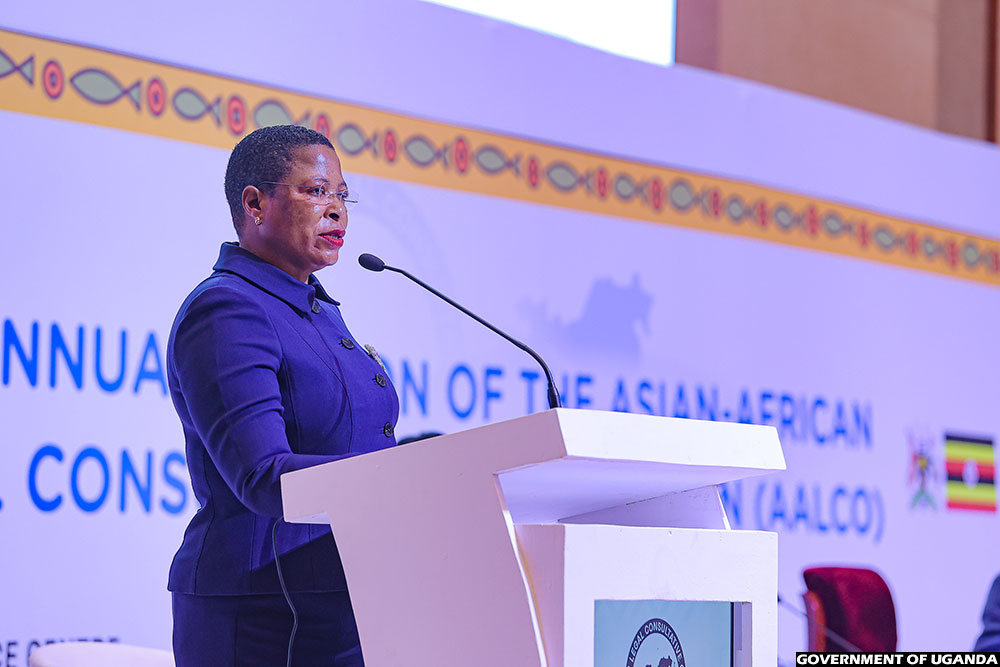
The five-day conference is running until this Friday (September 12).
It has drawn justice ministers, legal advisers, international law experts, and representatives from international organisations to deliberate on key issues of international law.
Engagements are continuing on day four (Thursday).
